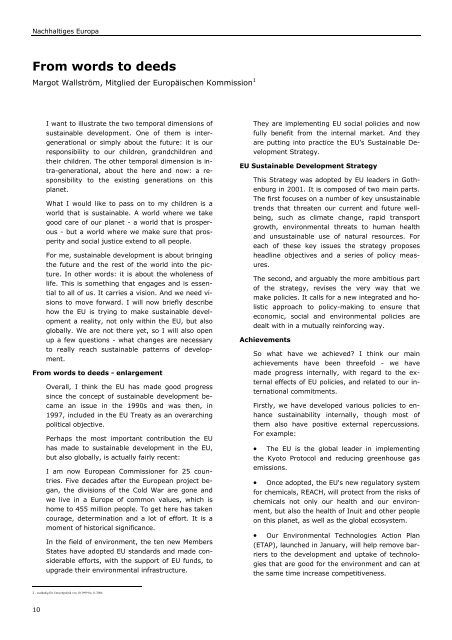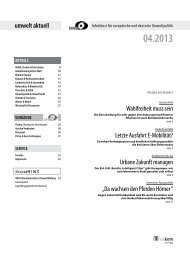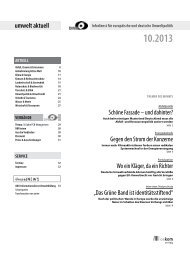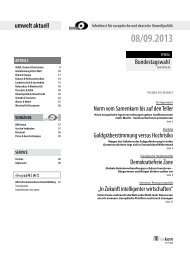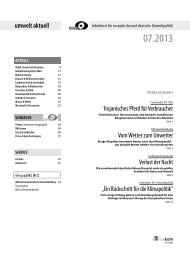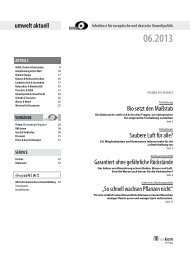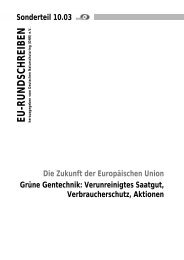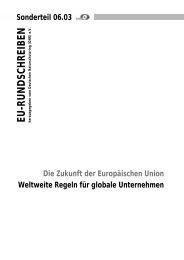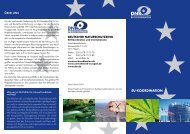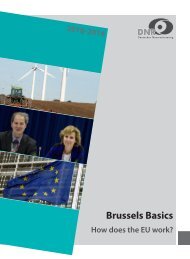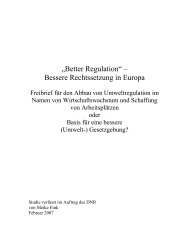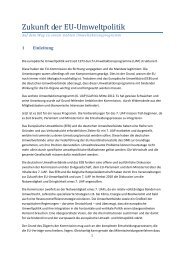Nachhaltiges Europa Abschlusspublikation - Global Marshall Plan
Nachhaltiges Europa Abschlusspublikation - Global Marshall Plan
Nachhaltiges Europa Abschlusspublikation - Global Marshall Plan
Erfolgreiche ePaper selbst erstellen
Machen Sie aus Ihren PDF Publikationen ein blätterbares Flipbook mit unserer einzigartigen Google optimierten e-Paper Software.
<strong>Nachhaltiges</strong> <strong>Europa</strong><br />
From words to deeds<br />
Margot Wallström, Mitglied der Europäischen Kommission 1<br />
1 , zuständig für Umweltpolitik von 10/1999 bis 11/2004<br />
10<br />
I want to illustrate the two temporal dimensions of<br />
sustainable development. One of them is intergenerational<br />
or simply about the future: it is our<br />
responsibility to our children, grandchildren and<br />
their children. The other temporal dimension is intra-generational,<br />
about the here and now: a responsibility<br />
to the existing generations on this<br />
planet.<br />
What I would like to pass on to my children is a<br />
world that is sustainable. A world where we take<br />
good care of our planet - a world that is prosper-<br />
ous - but a world where we make sure that prosperity<br />
and social justice extend to all people.<br />
For me, sustainable development is about bringing<br />
the future and the rest of the world into the picture.<br />
In other words: it is about the wholeness of<br />
life. This is something that engages and is essential<br />
to all of us. It carries a vision. And we need vi-<br />
sions to move forward. I will now briefly describe<br />
how the EU is trying to make sustainable development<br />
a reality, not only within the EU, but also<br />
globally. We are not there yet, so I will also open<br />
up a few questions - what changes are necessary<br />
to really reach sustainable patterns of develop-<br />
ment.<br />
From words to deeds - enlargement<br />
Overall, I think the EU has made good progress<br />
since the concept of sustainable development became<br />
an issue in the 1990s and was then, in<br />
1997, included in the EU Treaty as an overarching<br />
political objective.<br />
Perhaps the most important contribution the EU<br />
has made to sustainable development in the EU,<br />
but also globally, is actually fairly recent:<br />
I am now European Commissioner for 25 countries.<br />
Five decades after the European project began,<br />
the divisions of the Cold War are gone and<br />
we live in a Europe of common values, which is<br />
home to 455 million people. To get here has taken<br />
courage, determination and a lot of effort. It is a<br />
moment of historical significance.<br />
In the field of environment, the ten new Members<br />
States have adopted EU standards and made considerable<br />
efforts, with the support of EU funds, to<br />
upgrade their environmental infrastructure.<br />
They are implementing EU social policies and now<br />
fully benefit from the internal market. And they<br />
are putting into practice the EU’s Sustainable Development<br />
Strategy.<br />
EU Sustainable Development Strategy<br />
This Strategy was adopted by EU leaders in Gothenburg<br />
in 2001. It is composed of two main parts.<br />
The first focuses on a number of key unsustainable<br />
trends that threaten our current and future wellbeing,<br />
such as climate change, rapid transport<br />
growth, environmental threats to human health<br />
and unsustainable use of natural resources. For<br />
each of these key issues the strategy proposes<br />
headline objectives and a series of policy meas-<br />
ures.<br />
The second, and arguably the more ambitious part<br />
of the strategy, revises the very way that we<br />
make policies. It calls for a new integrated and ho-<br />
listic approach to policy-making to ensure that<br />
economic, social and environmental policies are<br />
dealt with in a mutually reinforcing way.<br />
Achievements<br />
So what have we achieved? I think our main<br />
achievements have been threefold - we have<br />
made progress internally, with regard to the external<br />
effects of EU policies, and related to our international<br />
commitments.<br />
Firstly, we have developed various policies to enhance<br />
sustainability internally, though most of<br />
them also have positive external repercussions.<br />
For example:<br />
• The EU is the global leader in implementing<br />
the Kyoto Protocol and reducing greenhouse gas<br />
emissions.<br />
• Once adopted, the EU's new regulatory system<br />
for chemicals, REACH, will protect from the risks of<br />
chemicals not only our health and our environ-<br />
ment, but also the health of Inuit and other people<br />
on this planet, as well as the global ecosystem.<br />
• Our Environmental Technologies Action <strong>Plan</strong><br />
(ETAP), launched in January, will help remove barriers<br />
to the development and uptake of technolo-<br />
gies that are good for the environment and can at<br />
the same time increase competitiveness.


